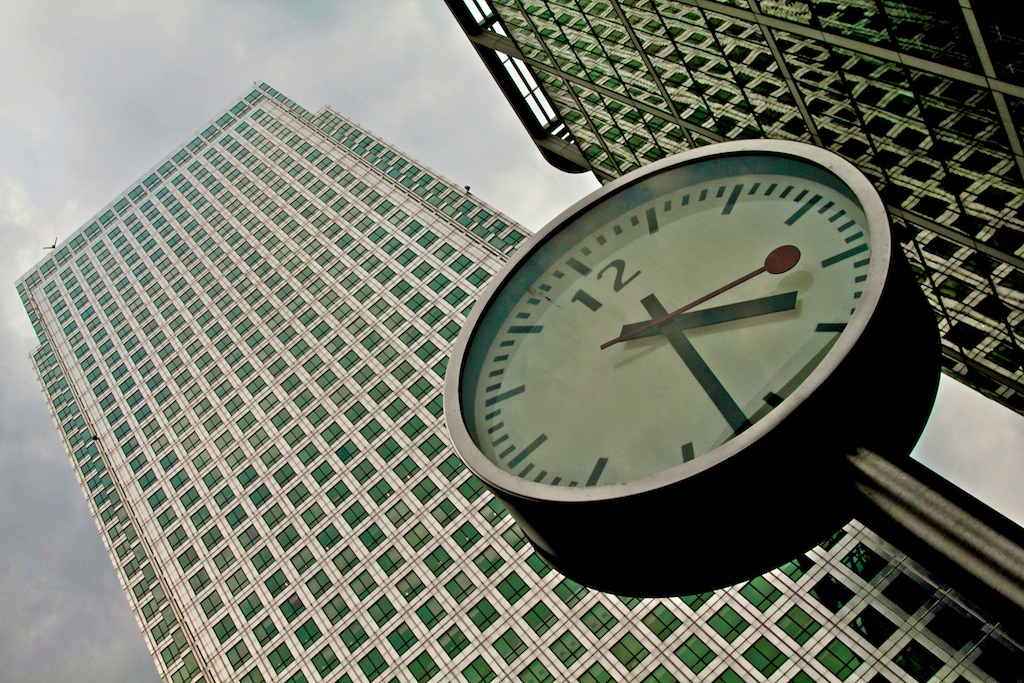Time for Revolution
Since joining Birkbeck, University of London as Lecturer in Modern & Contemporary Literature in 2013, I've been teaching the MA optional module "Time for Revolution: Reading Time in the 20th Century", which is available to students on the MA Contemporary Literature and Culture, the MA Modern and Contemporary Literature, and the MA Cultural and Critical Studies programmes.
This module explores the ways in which theories of time have affected the relationship between subjectivity and aesthetic production in the twentieth century. We focus on technological change, the experience of modernization, and the disciplinary effects of labour practices on temporal experience and political subjectivity, to consider how newly reconfigured philosophies and theories of temporality affected both the form and themes of modernist and postmodernist literature, films and TV. In particular, we examine the political implications of various temporal regimes and the way in which historical uprisings or moments of crisis have been conceived throughout the twentieth century in temporal terms via conceptualisations of static time, linear time, chaos, contingency, messianic apertures and utopian rupture. Students are encouraged to work in interdisciplinary ways asking questions of, and making connections between, a broad range of philosophical and aesthetic responses to one of the twentieth century’s most pressing ontological questions.
Module overview:
Week 1 | Introduction: Time, Power and History
- Alain Badiou, “Immediate Riot” in The Rebirth of History: Times of Riots and Uprisings, trans. Gregory Elliott (London: Verso, 2012), pp. 16-26
- Matthew Shaw, “Time and History” in Time and the French Revolution: The Republican Calendar, 1789 – Year XIV (New York: The Boydell Press, 2011), pp. 17-28
- E. P. Thompson, “Time, Work-Discipline, and Industrial Capitalism,” Past and Present, Vol. 38, No. 1 (1967): 56-97
- Karl Marx, from The Civil War in France (1871) (“The Paris Commune” and “The Fall of Paris”) [available on www.marxists.org: http://www.marxists.org/archive/marx/works/1871/civil-war-france/index.htm]
Week 2 | Duration, Relativity and Modernist Moments of Being
- Henri Bergson, "Creative Evolution," in Modernism: An Anthology of Sources and Documents, ed. by Vassiliki Kolocotroni, Jane Goldman, and Olga Taxidou (Edinburgh: Edinburgh University Press, 1998), pp. 68-71
- —, from Time and Free Will: An Essay on the Immediate Data of Consciousness, trans. F.L. Pogson (New York: Dover, 2001), pp. 104-110
- Virginia Woolf, To the Lighthouse (1927)
Week 3 | Utopia, Marxism and the Time of the Messiah
- Ernst Bloch, “C. Non-Contemporaneity and Contemporaneity, Philosophically” in Heritage of Our Times, trans. Neville Plaice and Stephen Plaice (London: Polity Press, 1991), pp. 104-116
- Walter Benjamin, “Theses on the Philosophy of History,” Illuminations, trans. Harry Zohn (London: Fontana, 1992), pp. 246-258
Week 4 | Time, the City and Money
- Georg Simmel, "The Metropolis and Mental Life," in Modernism: An Anthology of Sources and Documents, ed. by Vassiliki Kolocotroni, Jane Goldman, and Olga Taxidou (Edinburgh: Edinburgh University Press, 1998), pp. 51-60
- Metropolis (Dir. Fritz Lang, 1926)
Week 5 | Time and Narrative Theory
- Mikhail Bakhtin, “Forms of Time and of the Chronotope in the Novel: Notes Towards a Historical Poetics” in The Dialogic Imagination: Four Essays, ed. Michael Holquist, trans. Vadim Liapunov and Kenneth Brostrom (Austin, Text: University of Texas Press, 1981) [a scanned extract will be made available on Moodle]
- Paul Ricoeur, “The Fictive Experience of Time” in Time and Narrative, Volume 2, trans. Kathleen McLaughlin and David Pellauer (Chicago: The University of Chicago Press, 1985), pp. 100-152 [particularly the sub-section on mortal time and monumental time in Mrs Dalloway]
- Hilary P. Dannenberg, “Ontological Plotting: Narrative as a Multiplicity of Temporal Dimensions” in Coincidence and Counterfactuality: Plotting Time and Space in Narrative Fiction (Lincoln: University of Nebraska Press, 2008), pp. 45-64
Week 6 | Reading Week
Week 7 | Imagining the Future
- H. G. Wells, The Time Machine (London: Phoenix, 1995)
- F. T. Marinetti, “The Founding Manifesto of Futurism 1909,” Modernism: An Anthology of Sources and Documents, ed. by Vassiliki Kolocotroni, Jane Goldman, and Olga Taxidou (Edinburgh: Edinburgh University Press, 1998), pp. 250-253
Week 8 | Alternate Times and Counter-Histories
- Philip K. Dick, The Man in the High Castle (1962)
- “Episode 16: Peter” of the Second Season of Fringe (dir. David Straiton)
Week 9 | Postmodern Times and Simultaneity
- Kurt Vonngeut, Slaughterhouse Five (1969)
Week 10 | Feminist Other Times
- Marge Piercy, Woman on the Edge of Time (London: Women’s Press, 2000)
- Julia Kristeva, “Women’s Time” in The Kristeva Reader (London: Blackwell, 1986), pp. 187-213
Week 11 | Time and Memory
- W. G. Sebald, Austerlitz (London: Penguin, 2002)
- Andreas Huyssen, from Twilight Memories: Marking Time in a Culture of Amnesia (London: Routledge, 1995), pp. 249-260.
To view the module handbook for this module in 2014-15 please click on the link.
Image by @Doug88888 under a CC BY-NC-SA license.







 Dr Caroline Edwards is Senior Lecturer in Modern & Contemporary Literature at Birkbeck, University of London. Her research and teaching specialisms are in 21st century literature and critical theory, science fiction and post-apocalyptic narratives, Marxist aesthetics, and utopianism.
Dr Caroline Edwards is Senior Lecturer in Modern & Contemporary Literature at Birkbeck, University of London. Her research and teaching specialisms are in 21st century literature and critical theory, science fiction and post-apocalyptic narratives, Marxist aesthetics, and utopianism.
Follow / Contact